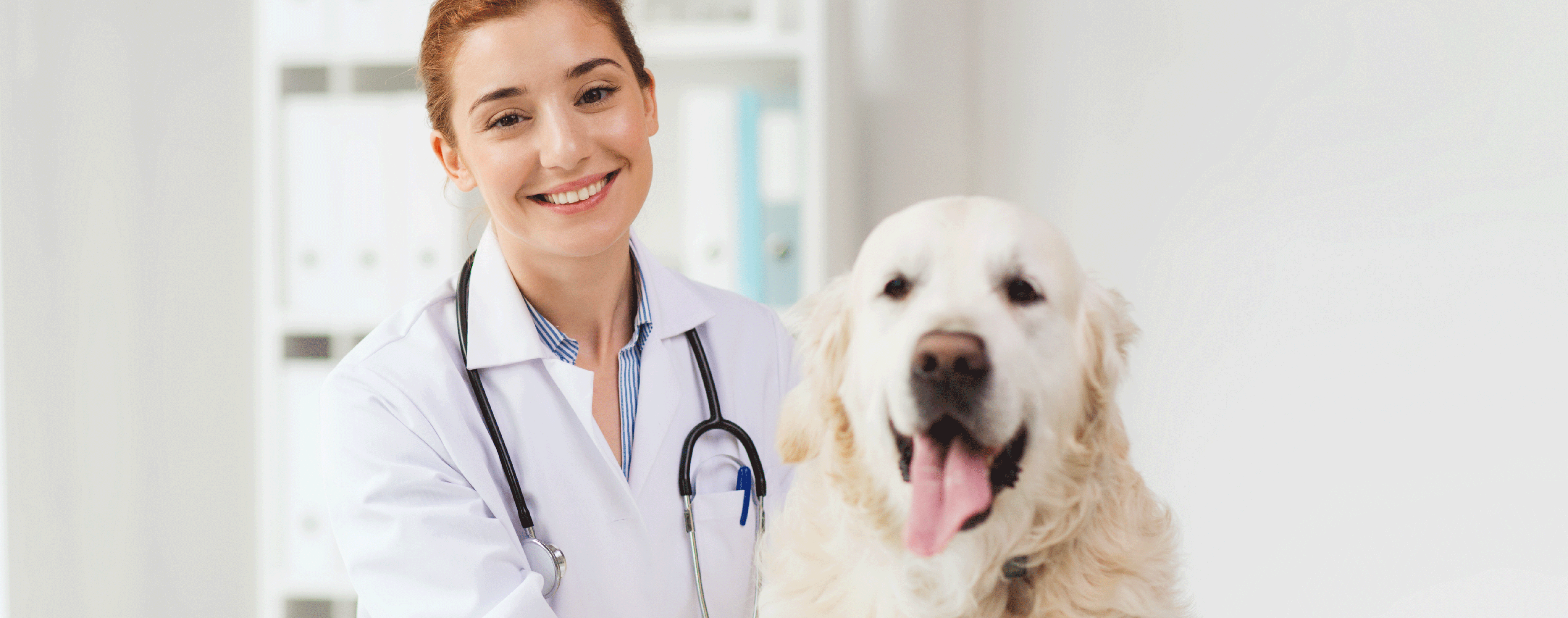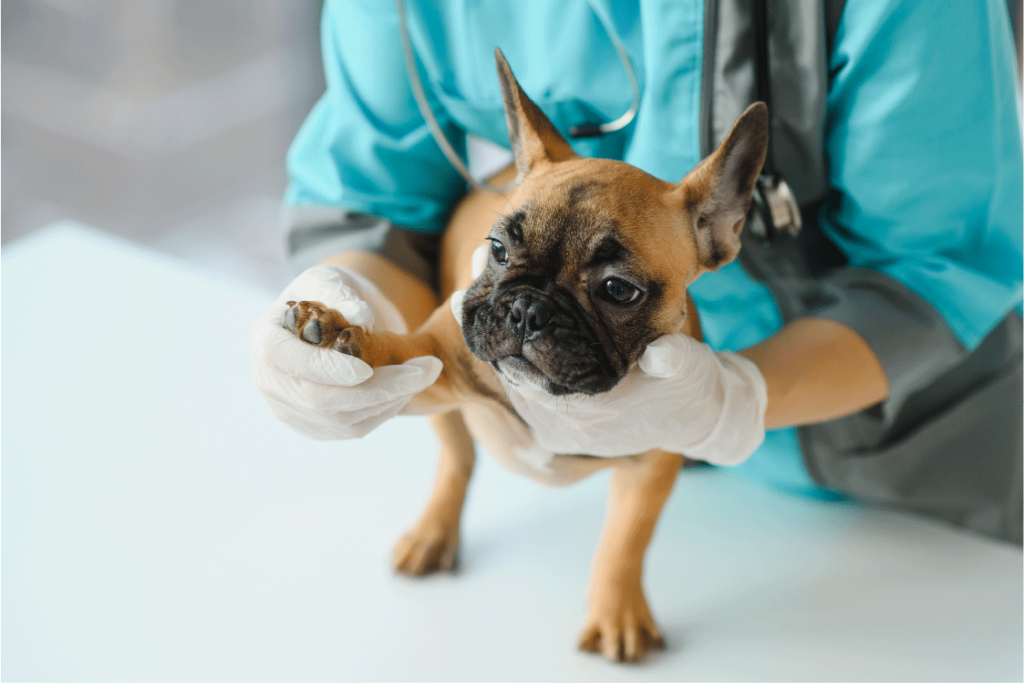
How to Talk to Your Vet about
Canine Cancer
Take Initiative – If you suspect something is off with your pet, there is no harm in calling your veterinarian and asking questions. Whether or not your dog’s breed is more susceptible to developing cancer, it is important to be proactive.
Communication is Key – It’s important to have an open dialogue between you and your vet when seeking the optimal solution for your pet. It also might be beneficial to become educated on the specific terms used when discussing canine cancer. You can find a glossary of terms surrounding canine cancer on the bottom of this page.
Come Prepared – In an effort to get the most out of your visit, inform your vet about any abnormalities occurring with your dog. Consider keeping a daily journal for a few days to record your dog’s behavior and share it with your vet. If you are seeing a new vet or a cancer specialist/oncologist, be sure they have access to your dog’s medical records.
Be Openminded – Various canine cancer treatments and procedures can come with different side effects. It’s important to talk with your vet to figure out what would work best for your dog and ways that you may be able to better manage these side effects. All cases are different and what might work for one dog, might not be best for yours.
Ask About Seeking Advice from a Cancer Specialist/Oncologist – Veterinarians who have had significant specialty training in cancer are available nationwide to provide expert advice and how to address your dog’s specific cancer diagnosis. Ask you vet about speaking to the oncologist associated with their clinic before you determine the next steps to take. You also can visit the Veterinary Cancer Society website to find a canine oncologist near you.
How to Check Your Dog for Signs of Cancer
Similar to humans, a dog’s risk for cancer increases with age. Our board-certified veterinarians put a guide together for dog owners to check for signs and symptoms of cancer. If your dog is showing any of the ten symptoms, especially in an abrupt change, contact your vet immediately.

Lumps and bumps/swellings underneath your dog’s skin

Unusual or abnormal odors from their mouth, ears, nose, or any other part of their body

Abnormal discharge from eyes, ears, mouth, or rectum

Sores or wounds that do not heal

Loss of appetite/ensuing weight loss

Coughing or difficult breathing/swallowing

Stiffness/loss of stamina

Evidence of pain

A change in urination and/or bowel movement habits

Increased drinking and urinating
10 Questions to Ask Your Vet about
Canine Cancer
A cancer diagnosis is one of the hardest things a pet owner can hear from their vet. It’s important that communication between you and your dog’s veterinarian is clear, and you feel comfortable enough to ask any and all questions about prevention, treatment, and your dog’s prognosis. Look below for the ten most important questions you can ask your vet about canine cancer.

Prevention

What are the most common types of canine cancer in my dog’s breed?

Are there particular treatment regimens for canine cancer prevention I can take?

What are the signs and symptoms of canine cancer I should look out for?
Treatment

Are some types of canine cancers more treatable than others?

What treatment options are available for dogs that develop canine cancer?

How often does treatment take place? Weekly? Monthly?

What are the expected side effects of treatment for canine cancer and are there ways or treatments that can manage them?
Prognosis

What are the chances that canine cancer can come back after treatment?

Can dogs fully recover from canine cancer with treatment?

How do I protect my dog from canine cancer once they’re in remission?
Canine Cancer:
Symptoms and Treatments
Canine cancer is a broad term for the many different types of cancers dogs can inherit. Similar to humans, canine cancer can be centralized, or it can spread through the body and affect multiple bodily systems and functions. Though canine cancers cover a wide variety of ailments and can affect different dogs varying by breed, some symptoms are common.
Symptoms:
Swelling, wounds that don’t heal, lumps and bumps, enlarged lymph nodes, lameness or swelling in the bones, and abnormal bleeding are all early indicators of canine cancer symptoms.
Treatment Options:
Treatment options also vary in the differing types of cancer, as well as severity. Primary options can include surgery, radiation therapy, and chemotherapy.
Surgery:
Surgery is often the most common treatment, as it is the first step to treat localized cancers and tumors and is frequently the most effective option available. The goal of surgery in treating canine cancer is to remove all of the cancerous cells. If the cancer is caught early enough that it has not spread, surgery can completely cure canine cancer. If the cancer has spread, and there are tumors inhibiting normal bodily functions, removing these tumors via surgery can also be used to increase the quality of life for dogs.
Radiation Therapy:
Radiation therapy as a cancer treatment works by killing or severely injuring cancerous cells that are then unable to divide and grow. The actual therapy process includes focusing a beam or field of intense energy on a certain area or organ of the body. This therapy is targeted to damage primarily cancer cells, while trying to minimize damage to normal cell growth in surrounding areas. Radiation therapy is administered in small “fractions” over a 3-6 week period, particularly if the radiation is targeting tumors. Side effects can vary depending on the location of the radiation therapy. Sensitive tissues, for example on the head and neck, can react with skin damage after exposure to radiation therapy.
Chemotherapy:
Chemotherapy, or drug therapy, is the most versatile cancer treatment, in that it can be used for a variety of different cancers at varying stages. It can be used to shrink, stop the growth of, or destroy cancer cells without imperative additional damage to the surrounding tissue. Recent advances in chemotherapy, as well as advances in managing chemotherapy side effects such as diarrhea, should be discussed with your veterinarian and canine oncologist to ensure your dog is benefiting from the latest canine cancer science.





